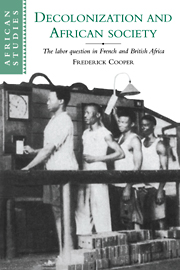Book contents
- Frontmatter
- Contents
- List of tables and figure
- Preface
- List of abbreviations
- Map of French and British colonial Africa
- 1 Introduction
- Part I The dangers of expansion and the dilemmas of reform
- Part II Imperial fantasies and colonial crises
- Part III The imagining of a working class
- Part IV Devolving power and abdicating responsibility
- Introduction
- 10 The burden of declining empire
- 11 Delinking colony and metropole: French Africa in the 1950s
- 12 Nation, international trade unionism, and race: anglophone Africa in the 1950s
- Conclusion: the social meaning of decolonization
- Conclusion
- Notes
- Bibliography
- Index
- OTHER BOOKS IN THE SERIES
Conclusion: the social meaning of decolonization
Published online by Cambridge University Press: 22 February 2010
- Frontmatter
- Contents
- List of tables and figure
- Preface
- List of abbreviations
- Map of French and British colonial Africa
- 1 Introduction
- Part I The dangers of expansion and the dilemmas of reform
- Part II Imperial fantasies and colonial crises
- Part III The imagining of a working class
- Part IV Devolving power and abdicating responsibility
- Introduction
- 10 The burden of declining empire
- 11 Delinking colony and metropole: French Africa in the 1950s
- 12 Nation, international trade unionism, and race: anglophone Africa in the 1950s
- Conclusion: the social meaning of decolonization
- Conclusion
- Notes
- Bibliography
- Index
- OTHER BOOKS IN THE SERIES
Summary
Why and how Great Britain and France decided to give up their colonies is a complex question. Only recently have historians begun to reexamine the early studies of journalists and political scientists, and a quite different picture is likely to emerge over the next decade. This study makes no attempt to answer the why question, but it does address a part of the how. By focusing on an aspect of what governments did with their power – on how they sought to reshape social organization – it helps to unravel the ways in which colonial regimes reconciled themselves to their conclusion and thought through what they could pass on.
The colonialism that began to come to an end in the 1950s was not the colonialism of the interwar years, which had made a virtue of its own inability to transform African society. Perhaps that form of colonialism could have staggered on for decades longer than the one that ended. What came apart with remarkable rapidity in the decade after World War II was colonialism at its most reformist, its most interventionist, its most arrogantly assertive.
Great Britain just before World War II and France at the war's end began serious soul searching on the subject of empire. Both powers came to see the labor question as a problem which European knowledge and experience could help to bring under control. Through the early 1950s, the project of making the African into industrial man – and more generally of making Africans into modern people – was viewed as one that required precise intervention from the possessors of the relevant knowledge and experience.
- Type
- Chapter
- Information
- Decolonization and African SocietyThe Labor Question in French and British Africa, pp. 451 - 454Publisher: Cambridge University PressPrint publication year: 1996
- 4
- Cited by



